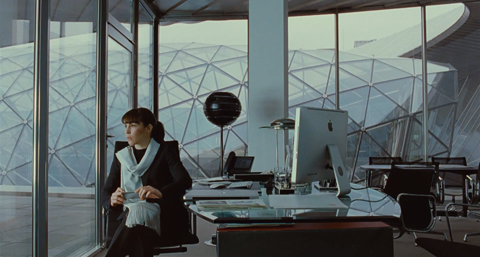FRAMES-WITHIN-FRAMES-WITHIN-FRAMES PRESENT AUTHENTIC VIEW OF 'THE WAY WE LIVE NOW'

Glenn Kenny posted some thoughts about Brian De Palma's Passion, in which he refracts what works about the new film through a lens of what he felt did not work in De Palma's Redacted. Responding to his tweet about Passion from yesterday, Kenny expresses his feeling that the film "doesn't have enough sex." Here's how Kenny lays it out:
"My initial attempted aperçu about this romp was: 'Passion purports to be a Brian De Palma remake of Love Crime but is in fact a Radley Metzger remake of demonlover." As we all know Twitter isn't so great with nuance and while the above is thereby wracked with small but not entirely insignificant innaccuracies I'll still stand by it. In any event Passion is, by De Palma standards, as compellingly watchable as his 2007 Redacted was aesthetically and by extension morally repellent. The problems with Redacted were many, but the main—formal—one casts a useful light on what helps makes Passion work. That is, the various visual platforms from which De Palma told Redacted's story were so haphazardly contrived/executed as to very nearly scotch De Palma's rep as a visual "master." The 'surveillance video' didn't look like surveillance video, the computer screen chats didn't look like computer screen chats, etc. 'Brechtian' or not, this created the wrong kind of alienation effect. Someone or something must have made DePalma understand this since that time, because Passion shows he's done some homework. While I daresay a very sharp dissector could point out ways in which total accuracy eludes him, the phone-camera advertising spot and hotel sex file look convincingly and compellingly authentic, as does all the multi-screen Skypeing in the picture, and more. That these screens all appear in frames put on real celluloid film by longtime Almodóvar cinematographer José Luis Alcaine. Long a top player in the realm of split-screen and multi-bifurcated compositions, De Palma really makes his frames within frames within frames work for him here.
"And this, some will intuit, is in the service of saying something about The Way We Live Now. In a way the real world has caught up with a vision that De Palma has always been putting forward, one that he and his fellow movie brats intuited from Michael Powell's Peeping Tom perhaps: that we are always looking, and we are always looking not at what is, or more to the point, ought to be, in front of us, but at something we're putting in front of us, some screen containing some contrivance of what we would like to think is our desire. This vision has become, for De Palma, so distilled (some would say rarified) that his best work of the past twenty years or maybe even more (hey, I really LIKE Femme Fatale!) has almost everything to do with that idea and nothing to do with the way actual human beings behave or speak. So the ridiculously flat dialogue and almost pantomime performance styles on display in Passion will not come as any surprise to a longtime De Palma watcher, although they are likely to elicit some sort of 'That was stupid' reflex in non-adepts. No matter—does this thing even have a U.S. distributor yet? In any event, in adapting the tonally straightforward but full-of-myriad-plot-twists 2010 Alain Corneau thriller Love Crime (a far more conventional picture than his still brain-melting 1979 Serie Noire, the seediest of Jim Thompson adaptations, and that's really saying something), De Palma insists of course on reconfiguring it into a movie not about the duplicity of cinematic subjectivity and then cranking the volume of that subjectivity up to eleven once a strong prescription sleep aid enters the scenario of ruthless corporate one-upswomanship.
"[I]t's a hoot, all right, but it isn't quite Radley Metzger, which is to say in a sense that it isn't quite Brian De Palma either. It doesn't have enough sex, is the thing. At 72 hardly an enfant terrible any longer, De Palma is nonetheless palpably constrained. American female stars of the bankability caliber necessary to obtain foreign funding (if I read my credits correctly there's not one American dollar in this movie, so to speak) simply won't do the kind of thngs De Palma leading ladies of the '80s had little if any trouble with. Hence, the ostensible sapphic tensions between the characters played by Rachel McAdams (American Canadian [see comments], appears in her underwear) and Noomi Rapace (European, appears topless) don't really get all that much traction and the most explicit stuff here is in the reveal of sex toys. Being an old master doesn't cut certain kinds of ice these days, I guess. I almost feel sorry for the guy."



